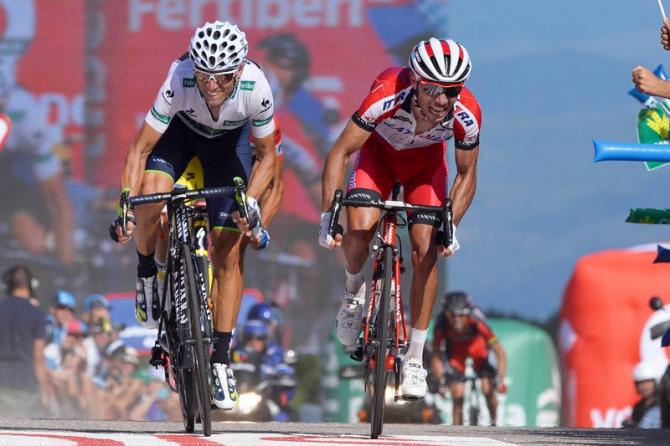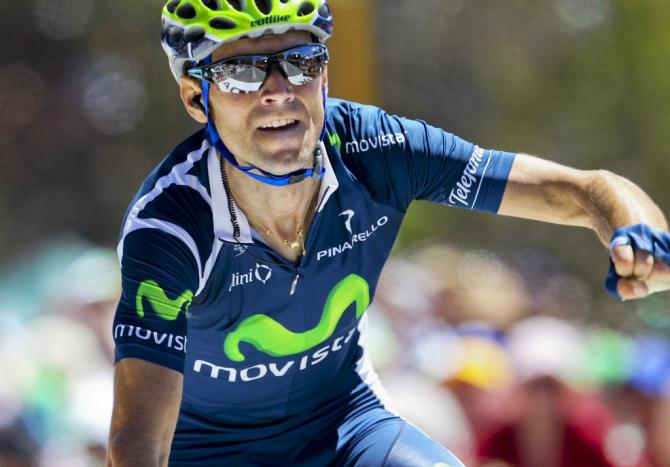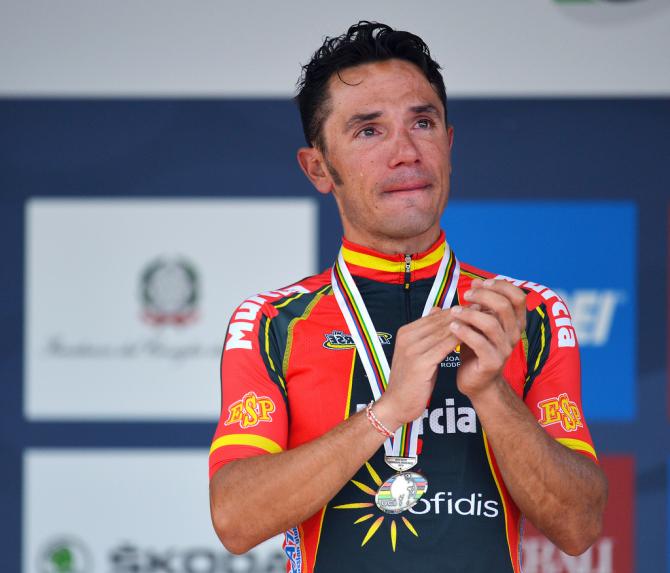Valverde: 'The Vuelta’s first half suits me'
Rodriguez predicts Andorra stage will 'have an impact on cycling world-wide'



2009 Vuelta a España winner Alejandro Valverde (Movistar) has recognised that the opening stages of the Vuelta in 2015 are “very good for me” - and if the Vuelta’s first few days in Andalusia in 2014 are anything to go by, Valverde could well be the rider to beat in the race’s first week next August, too.
Last year - also in Andalusia - Valverde led the Vuelta early on, the day after his Movistar squad took the opening team time trial in Jerez de la Frontera. He then returned to the lead with a spectacular victory in the uphill finish at La Zubia on stage six, before finally finishing third overall - a result which left Valverde in an all but unbeatable position in the UCI WorldTour’s individual classification.
As for next August, the first week’s series of short, sharp uphill finishes in Andalusia, culminating in a much more difficult ascent on stage seven to Capilleira should be right up Valverde’s street again. The Alpujarras climb is in an an area of Spain Valverde knows well, given he regularly trains at altitude nearby, basing himself at the Sierra Nevada ski station.
“It’s a very well-balanced route, but very demanding,” Valverde, now 34, said during the Vuelta 2015 presentation. “The time triallists and climbers will both have their opportunities, but there can be a few days for breakaway specialists to go for it as well.”
Stage two and stage four’s short but tricky uphill finishes, particularly with time bonuses once again on offer throughout the race, could well be opportunities for Valverde to snatch both the lead and early triumphs in the first week.
“But those stages also good for riders like Purito [Joaquim Rodriguez - Katusha],” insisted Valverde, who first finished on the Vuelta podium back in 2003, when he took third and the points jersey.
“They are all difficult ascents where you need to make a sudden acceleration and you have to fight to be sure you don’t start sliding down the overall classification by a few seconds. Positioning on those stages is going to be very important, and you have to be really focussed throughout.”
Get The Leadout Newsletter
The latest race content, interviews, features, reviews and expert buying guides, direct to your inbox!
As for the stage to Capilleira in the Sierra Nevada mountain range, “it’s going to wear the riders out. The first part of the stage is a real leg-breaker, and the last climb is a challenge, but it’s the heat that could really make people suffer.”
A stage finish in Valverde’s home town of Murcia then follows, after a double ascent of the Cresta del Gallo climb. “It’s a tricky day, because the ascent [of the Cresta del Gallo] is difficult, and the descent is really, really technical, and we have to do it twice.” The next stage, to the Cumbre del Sol, is one Valverde may well like, too, given local journalists have said the Vuelta’s fifth ascent is similar to the one where he won at La Zubia in 2014, “not too long, maybe five or six kilometrs, but with steep sections.”
“But overall the Vuelta’s first part doesn’t have too many long climbs, and those steep finishes will suit me very well,” Valverde concluded.
Rodriguez believes Andorra stage will be historic
The second part of the Vuelta begins in Rodriguez's adopted home country of Andorra, and the Katusha climber says he believes the ultra-hard stage 11 “will have an impact on cycling both in the Vuelta and on cycling world-wide.”
“It’s closer to a stage in the Dolomites in the Giro than to the stages in the Vuelta or Tour we’re used to seeing. This is one that will go down in history because it’s so hard.”
As for the second week of climbing in Cantabria and Asturias, Rodriguez told Spanish TV “I know the Escudo - a first category climb mid-way through stage 14 - but not the [final ascent that day] of the Fuente del Chivo.”
“I can see, either way, that it’s a very hard stage, you’ll be feeling worn down by that point in the race and on top of that, stages like that are ones where everybody wants to have a go. Some riders will want to improve their placing overall or try to secure their position on GC, and breakaways will be going from all sides because that stage exactly the right sort of terrain to go for it.”
Rodriguez, for one, is a fan of the time bonuses that will once again feature at the end of each Vuelta stage. “They make you want to attack because you know that there’s a big difference between finishing third or finishing fourth, even if the first place is out of reach.”
As for the final mountain top stage at Ermita del Alba on stage 16, the second straight stage in the Asturias region, “it’ll be another really difficult finish. We know the area well from many previous Vueltas, but we’ll have to go and check out that climb” - just seven kilometres long, but said to be very hard throughout.
Rodriguez was adamant, too, that the final three stages in the sierras north and west of Madrid “can change things around,” despite there not being a summit finish like the region’s Bola del Mundo climb, where Vincenzo Nibali sealed his overall victory in 2010 just 24 hours before the race ended.
“They are the kind of mountain stages that the fans really like, and when everybody’s starting to feel on the limit after three weeks of racing. Something always happens there, there are always surprises.”
Overall, Rodriguez argues, “it’s a Vuelta route where you have to be in good shape from the beginning to the end, you can’t start trying to pick up form during the race itself. The last week doesn’t seem so hard, but by that point, everybody’s feeling tired”.
Rodriguez knows what he is talking about, too; in 2010 he lost the Vuelta with a disastrous performance in the final week’s long, flat time trial at Peñafiel, just like the one in Burgos in 2015. Then in 2012, an attack by Alberto Contador on the road to Fuente De came at a point in the third week where Purito seemed all but certain to win. Instead, Contador was able to net his second Vuelta overall victory just when it was least expected.
Alasdair Fotheringham has been reporting on cycling since 1991. He has covered every Tour de France since 1992 bar one, as well as numerous other bike races of all shapes and sizes, ranging from the Olympic Games in 2008 to the now sadly defunct Subida a Urkiola hill climb in Spain. As well as working for Cyclingnews, he has also written for The Independent, The Guardian, ProCycling, The Express and Reuters.
